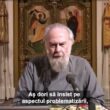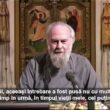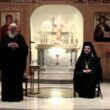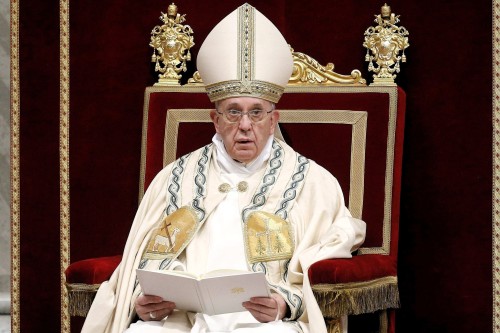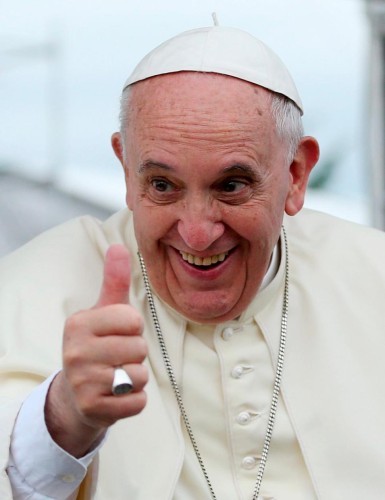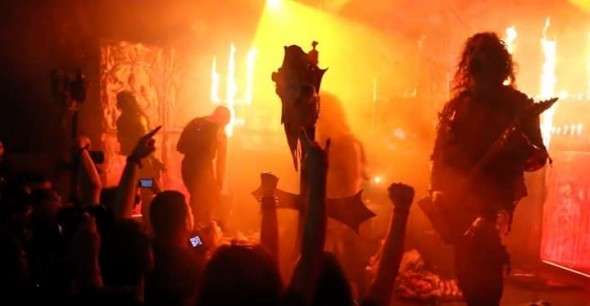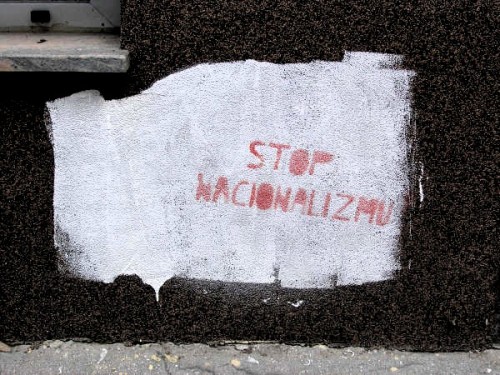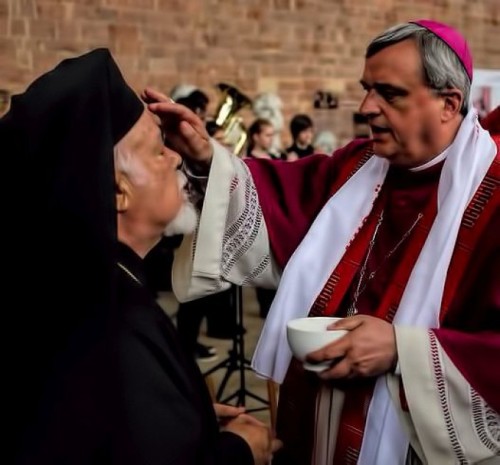According to the traditional teaching of the Orthodox Church, all people are sinners and lack the glory of God, as Saint Apostle Paul tells us: since all have sinned and continue to fall short of God’s glory (Romans 3, 23). Even the Theotokos who is so glorified and praised as being more honored than the cherubim and more glorified than the seraphim, comes from the family tree of Adam and Eve and also inherited the ancestral sin. She called her Son My Savior, as the evangelist Luke says (Luke 1, 47): …My spirit exults in God, my Savior. Thus there is no living man on earth who lives a sinless life even for a single day according to the word of our Savior.
The western Church, having its center in the Church of Rome, was the first from the point of view of hierarchy and honor (primus inter pares) among the other four patriarchies – Constantinople, Alexandria, Antioch and Jerusalem. Even from its very beginning and throughout centuries, the representatives of Popes believed that they could control and stir a finger both in the inside problems of the other churches and the political issues of the western countries without having this right established by the churchly tradition.
This mania of Popes to carry out an earthly and churchly power determined pope Pius IX at the Council from 1870 to proclaim the infallibility of all Popes throughout the history of Rome. Seven hundred catholic bishops participated there. Yet, a part of them refused to sign and indignantly left and reasoned their action through the fact that there was no such type of dogma in the Church of Christ. They separated from the Roman Catholic Church and created their own church that nowadays is spread over many western countries. It is called the Old Catholic Church and its official enouncement took place in Utrecht, Netherlands 1889 when the following were established:
-
it says loyal to the faith of the Early Church as it was established in the confessions of faith during the Ecumenical Synods of the One and Undivided Universal Church of the first millennium;
-
it rejects the Papist dogma adopted in 1870, meaning the Papal infallibility, earthly power and his primacy to the other bishops; they of course accept him as Pope, as first among equals, as the Ecumenical Synods and Fathers of Church established;
-
it rejects the dogma established by Pope Pius XII in 1854 about the conceptia immaculata of Virgin Mary that that is supported neither by the Holy Scripture nor by the Holy Tradition of Church;
-
it does not accept the decisions of the Synod of Trident from Spain except those which are according to the teaching of the Early Church;
-
it hopes that by its drawing near to the teachings of the Early and Undivided Church to be able to overcome the differences that resulted into the Schism.
The other bishops that stayed at the Council, signed like slaves the Papal decision about infallibility bringing as argument the misinterpretation of some biblical verses (Matthew 16, 18 and Luke 22, 32) and through scholastic syllogisms, alien to the authentic Christian spirit, they dogmatized the following, despite the plenty reactions against: “We define as a definitely revealed dogma that: The Roman Pontiff, when he speaks ex cathedra meaning when in exercise of his office, shepherds and teaches all Christians, he enacts by the virtue of his supreme apostolic authority and defines a doctrine concerning faith or morals to be held by the whole Church. He possess this power through the divine assistance promised to him in blessed Peter. He inherits this infallibility that the divine Redeemer willed his Church to enjoy in defining doctrine concerning faith or morals. Therefore such definitions of the Roman pontiff are of themselves, and not by the consent of the Church, infallible.”
By this dogma, the Roman Pontiff placed himself beyond the episcopal rank on a special rank, inexistent by then, the papal rank that became superior even to the Ecumenical Synods. Moreover, this level is superior even to the Church that is exclusively founded on the Pope and that cannot exist without him! In other words, the Church is no longer the Body of Christ but it identifies with the Pope himself. As long as the Roman Pontiff is entitled to define dogmas outside synods and do not require the blessing of Church it means that he is a kind of superhuman. In this way a divine characteristic, of infallibility that belongs only to the Church of Christ is taken over and the Pope, in the eyes of simple Catholic is deified and becomes likewise an earthly god.
If the papal infallibility was inherited by the Apostle Peter and offered as a holy gift to each Pope it would then mean that all the popes throughout history were infallible. We wonder ourselves, where the infallibility of Pope Honorius and Virgiliu was, who were condemned as heretics during Ecumenical Synods and were anathematized. Where is the infallibility of the Pope Alexander IV Borgia (1492-1503) that committed to a lot of sins and by whose memory even the Vatican is ashamed of? Or Pope Adrian V or almost the inexistent Damasus III or Popes John IX (931), Leon V (903), Sergiu III (904-911) and many others who were deposed by the Catholic Church itself, were they also infallible?
If, according to this papal decision, there is no church outside the Pope, how do then the other Churches exist that were founded before the Church of Rome? When the Pope dies who will get the infallibility till the election of a new one? And if the intermediate range of time is longer than a week, like 40 years, as it happened during Leon I who will lead the Church of Christ? Will it be left without a leader for so many years?
Neither the Apostle Peter, whom they consider the source and the bearer of infallibility had ever declared that he was infallible as long as he, before Pentecost, was under the influence of a mood dominated by superficiality and egoism (Matthew 16, 23; Mark 14, 29). This decision transformed the Papal Church into an anthropocentric leadership system because the leader of the Church of Rome is no longer Christ but a sinner, the Pope. In essence, Christ is casted out, sent to Heaven and His place on earth is taken by the Pope who has absolute power by law. Moreover, through the synodic decision of Synod I of Vatican in 1870 there is no salvation outside the Pope! Anyone who denies the Pope denies the Church of Christ and will take the place of Judas in the life after. The Pope becomes a sovereign in the Church. He believes he inherited this power from the Apostle Peter and he holds all the power that the Church of Christ has.
Such type of synodic decision hinders once and for all the possibility of a Catholic to become saved because he already believes that he will get his salvation only through the Pope who appears as a second redeemer (or even the only one!). In other words, this heresy – that according to the Christ’s sacrifice on Cross is not sufficient anymore to save the world but it needs to be completed by the intercession of a sinner as a second redeemer – has integrally affected the authentic teaching about the salvation of man. The statement according to which a man has the power to determine the salvation of the world is a sin against the Holy Spirit. The work of Holy Spirit in the world is considered to be incomplete and incapable to save and deify the man and for which reason that man is condemned in fact by the papists. But, glory to Pope Pius IX who corrected this weakness of the Holy Spirit and he came in for help involving himself and therefore the papal institution as collaborators of the Holy Spirit to save the world! Still, we haven’t heard about who will judge the popes and will lead them to salvation? Or maybe they stopped being humans and they magically become deified? How did this happen? Who will enlighten us?
The Papal Church theoretically acknowledges Christ and Holy Trinity but their leader on earth is not Christ anymore but each Pope at his turn. He has the right to decide over all the earthly and heavenly ones and even over hell. That is why the worthy of remembrance Professor of theology Constantin Mouratidis said: “Therefore the Pope is not the representative of Christ on earth anymore but Christ became the representative of Pope in Heaven”. The Pope believes he is a kind of a super bishop and that he has the right to stir a finger within the inside issues of local churches and to authoritatively solve all of them. This is the absolute power in Church. What the Pope preaches as teaching does not need the approval of any synod. The catholic theologian claim that Pope represents an intrinsic authority with no need of a synod while the synod is invalid without the Pope. But if the decisions of their synods, with no approval from the pope, are invalid, why do they continue to convoke them? As long as a single man, the Pope is sufficient to lead their church, yet why have they convoked 20 synods up to now?
We would like to ask one of the well-intended Catholics since when has the Pope become infallible? Since 1870 and even before that? If their infallibility, as their theologians say, comes from Peter the Apostle what will they say about the popes before 1870 when others where deposed by synods as being heretics? How did the popes inherit the infallibility from Saint Peter as long as Peter as a sinner before the descent of the Holy Spirit was not an enlightened person and he was inclined to sin? The Lord called him at some point satan (Matthew 16-21, 23). Do the popes endorse themselves, as successors of Peter, also this characteristic as long as they claim they inherited all from him?
The biggest impiety of them is to believe that this dogma of infallibility represents a divine revelation and the gift of God in their church and that the salvation is accessible from that moment on only to those who lived after 1870 and who silently and with limitless piety accept and respect this dogma!
When the professor of the Faculty of Theology from the University of Tubingen – Germany, Hans Kung in 1980 during his classed questioned pope’s infallibility he immediately caused the Vatican’s dark propagandistic mechanism that focused on degrading and cast him out of the department. Here is what Pope John Paul II immediately declared then: “If a man alienates from the dogma of infallibility that is Christ’s gift, he will alienate from the authentic faith.” Thus, the Pope defends his infallibility even till the death of his servants! Because, according to his opinion infallible means authentic faith.
For us the orthodox the infallibility is not held by a Bishop even if he is a Patriarch, but by all the Church in its plenitude that, as Saint Apostle Paul writes, is the pole and the base of truth. The supreme authority within the Orthodox Church is represented by the Ecumenical Synods where its decisions with a universal character are acknowledged and accepted by the whole Church.
“The dogma of papal infallibility is the heresy of heresies, an unprecedented rebellion against Christ, God-Man. It is practically a horrible cast out of our Lord Jesus Christ from earth. It is a new betrayal of Christ, a new crucifixion…” (Saint Iustin Popovici, Man and God-Man, p 127-159).
Thus we realize with a lot of grief that through this dogma those from the papal church overpassed the Jews and occupy the throne of Christ with their own “messiah”, the Pope.
Recently, during the meeting of Pope Benedict with the Patriarch Theophilos of Jerusalem (on May 2009) the Roman Pontiff expressed his grief for the shame of discord in the Church of Christ. We believe that he is deeply wrong when he states that the Church of Christ is discorded. The Church of Christ, that the gates of hell shall not prevail against (according to Matthew 16, 18) is unchanged, the One, Holy, Universal, Orthodox and Apostolic that continues its saving ministry in the world. It is existentially united with its Founder and Redeemer our Lord Jesus Christ with Its pure teaching, Holy Sacraments, clergy and Christ loving nation. Does he actually want to “save” this as well as he “saved” his own Church of Rome? Still there are other so-called “churches” separated from the body of the One Church of Christ, as the Armenian, Coptic, Old-Catholic and others. How come the leaders of these churches do not worry about the Church of our saints that is tight with their teaching and their holy relics?
We, the orthodox do not ask the unification of churches in the way that papists or the so-called ecumenists ask because in our acceptance the Church of Christ is not divided or discorded. One of the historical churches lost the grace of the Holy Spirit and alienated from it. If they wish to come back, who is stopping them? It is enough for them to come back to the Church of the first ten centuries when also the Church of Rome preserved unaltered the dogmas and traditions of the One and Only Church and when it was aliened to any kind of human selfish intervention. The other churches alienated as well throughout centuries but at least in them does not exist the satanic innovative spirit of their leader’s infallibility. And they do not proudly and wily come to mock our Church and consider us… heretics!
We regret that the devil succeeded in leveling away the Early Church of Rome from its grace and apostolic mission. The reversal of values by entrusting the leadership of Church to a man, involved together with it the addition of other theological errors both in the field of teachings of faith within Christ’s Church and in ministering the Holy Sacraments.

